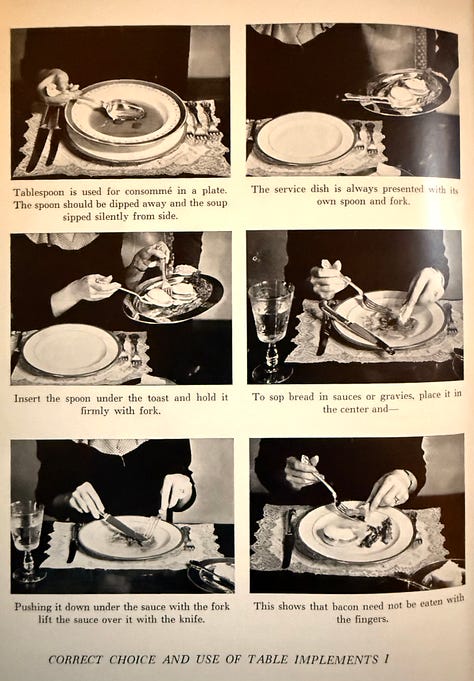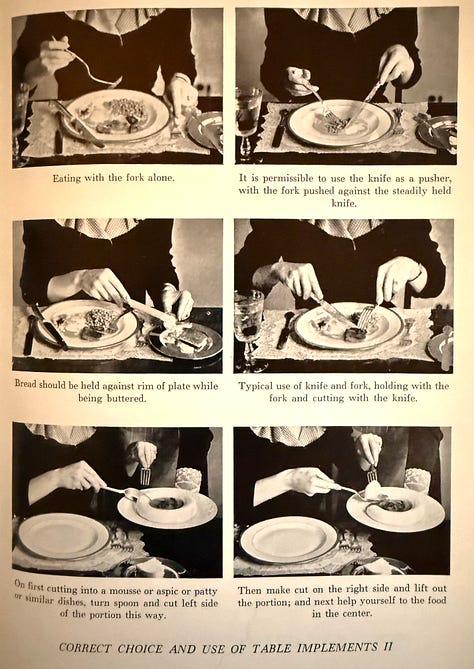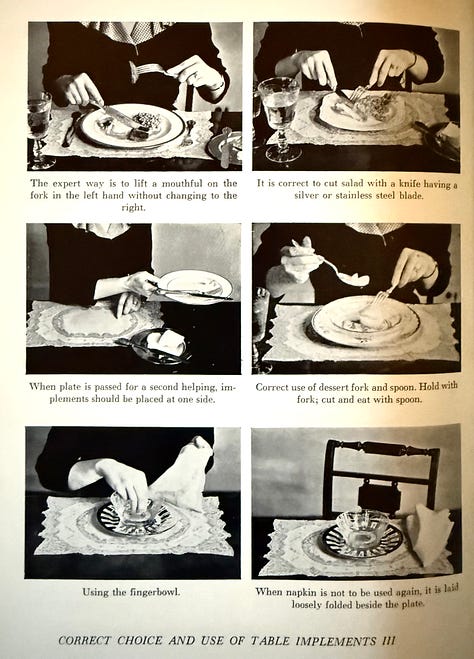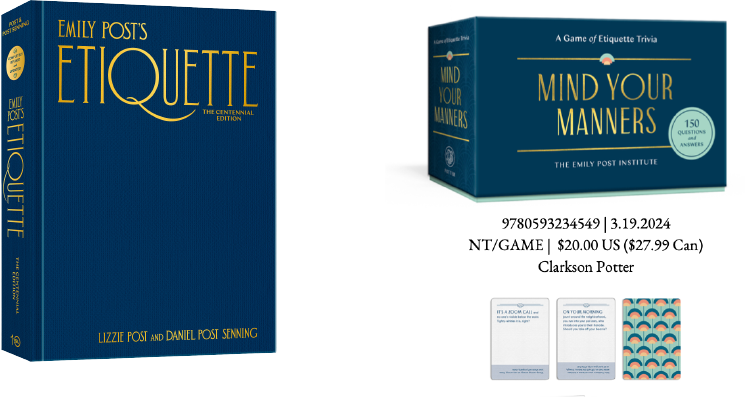Etiquette Throwback 1955: Emily Post's Etiquette, Table Manners
A really great photo set accompanies Emily's Table Manners advice.



Emily Post’s Etiquette, 1955: Table Manners
Emily Post’s 1955 edition of Etiquette was written and published in the last decade of her life. Like all her editions, it often talks about tradition and formality and balances that with what people were seen doing at the time. Even table manners, which change slowly and rarely, receive mentions of “nowadays” or “outside of a formal meal…”
We adored the pictures that went along with this section and have included all in this piece. Since there is so much great content, we chose a few that either don’t get as much attention as some of the classics or that we found fascinating, like Emily discussing elbows on the table. We hope you enjoy this sampling of Emily’s mid-century work!
*Please note that the grammar and spelling in the following excerpt follow 20th-century standards.
Chpater 41 Table Manners
A SELECTION OF SECTIONS
WHEN HELPING YOURSELF
When helping yourself, the first rule is to pay attention to what you are doing and not handle a serving fork or spoon in such a way as to scatter food particles over either floor, table, or yourself.
Anything served on a piece of toast is usually lifted off on the toast, unless you don't want the toast, in which case you may take the quail or help yourself to asparagus and leave the toast in the dish. For sweet-breads, mushrooms on toast-foods that seem to be an arrangement-take the toast and all on the spoon and hold it in place with the fork.
If there is only a serving spoon and no fork in the dish, you balance the food as carefully as you can.
WHEN YOU HELP YOURSELF TO CONDIMENTS, GRAVIES, PICKLES, JELLIES
Gravy should be put on the meat, and the condiment, pickles, and jelly at the side of whatever they accompany. Olives, radishes, or celery are put on the bread and butter plate if there is one; otherwise on the edge of the plate from which one is eating. Salted nuts are put on the tablecloth.
When helping yourself, you say nothing; but when declining a dish offered by a waiter, you say, "No, thank you." Your voice is barely audible and in fact a negative shake of the head and "Thanks" more nearly describes the usual refusal.
WHEN PASSING PLATE FOR SECOND HELPING
Always leave knife and fork on the plate when passing it and be sure the handles are far enough on not to topple off.
ON THE SUBJECT OF ELBOWS ON THE TABLE
Although elbows on the table are seen constantly in highest fashionable circles, a whole table's length of elbows, planted like clothes-poles, and hands waving glasses or forks about in between is certainly not an attractive dinner-table picture. And yet there are some situations when elbows are not only permitted but are actually necessary - especially on tables in restaurants when people are lunching or dining at a small table of two or four, and it is impossible to make oneself heard above music, and at the same time not be heard at other tables nearby, without leaning far forward. And in leaning forward, a woman's figure makes a more graceful outline supported on her elbows than doubled forward over her hands in her lap as though she were in pain! At home, when there is no reason for leaning across the table, there is no reason for elbows. And at a dinner of ceremony, elbows on the table are rarely if ever seen, except perhaps at the ends of the table, where again one has to lean forward in order to talk to a companion at a distance across the table corner.
Elbows are never put on the table while one is eating. To sit with the left elbow propped on the table while eating with the right hand or to prop the right one on the table while lifting fork or glass to the mouth must be avoided.
SALT
If there is no spoon in the saltcellar, use the tip of a clean knife. If the saltcellar be for you alone, use your knife or take a pinch of salt with your fingers.
SALT ON THE TABLECLOTH
Putting salt on the tablecloth and then pinching it between the fingers to put on food is a very old custom and therefore not incorrect if it so happens that a saltcellar is not on one side or the other of one's plate. But dipping celery or radishes into this salt on the tablecloth is never permitted. Salt that is to be dipped into should be put on the bread and butter plate or on the rim of whatever plate is before you.
NAPKIN UNFOLDING DOES NOT MATTER
The only thing that matters is that a napkin shall stay on your lap. In addition to the suggestion on page 358 for keeping a large dinner napkin in place, one who has a shelving lap will perhaps find it practical to carry a pair of small spring clips with which to clip a too little or too heavily starched napkin to her dress or the edge of his waistcoat. After all, it isn't of much use on the floor!
BONES, PITS, AND SEEDS
Fish bones or other incidental bones are taken between finger and thumb and removed between compressed lips. Pits and seeds must be eaten quite bare and clean in the mouth and dropped into the cupped fist and then into the plate. The pits of stewed prunes or cherries that are eaten with a spoon are made as clean and dry as possible in the mouth with the tongue and teeth, and then dropped into the spoon with which you are eating, and conveyed to the edge of the plate. Even so, people with best manners usually drop the pits even of stewed prunes or cherries into the cupped hand, held close to the lips.
There were a few things from these passages that stood out to us. The specificity of taking things like squab and asparagus off of toasts they may be presented or served on was interesting and is maybe a bit of a peek inside what was fashionable to serve for formal meals in the fifties.
We loved the specificity Emily uses to define when elbows on the table are permitted and when they aren’t. Her depiction of a table full of people all with their elbows on the table and waving about their implements and glasses definitely gave us a chuckle. Emily, she does have a way of showing us when we’d look silly.
Both points about the salt were new to us. And they painted such a more casual (and in some cases practical) image of salt at the table. Often the advice we are thinking of is passing the salt (and pepper) and how to manage a saltceller with a spoon (a silver spoon should not be left in the salt as it will tarnish easily.) And we loved reading about how one might use salt for vegetables to be dipped in.
We hope you’ve enjoyed this throwback and that you’re gearing up for a wonderful holiday week next week! Tell us what you have planned for the holidays and whether or not a formal feast is in your future! If you can’t post here, head on over to the Monday post, where the comment thread is open to all.
Win A Copy of Emily Post’s Etiquette or our Trivia Game!
You’ll have a chance to win either a signed copy of Emily Post’s Etiquette the Centennial Edition or a copy of our Mind Your Manners trivia game. Three winners for each prize.
Emily Post has gotten behind the amazing and easy to use digital invitation service PartyClick, and to celebrate; we’re hosting a Holiday Cocktail Party Challenge!
Host a holiday cocktail-style party using PartyClick for your invitations and RSVPs. Enter your bar set up or best hors d’oeuvres recipe for a chance to win a signed book or trivia game! Click the button below for more details!
*One giveaway entry per party for each giveaway.
HELP KEEP EMILY POST PUBLISHING QUALITY CONTENT It takes a lot for this small team to keep Emily Post's etiquette relevant today. If you enjoy this publication and would like to ensure it continues, please join our paid Community Membership. It is the most impactful way to help. Thank you for considering it. Your support makes a big difference.
Thanks for taking the time to explore some old-school etiquette with us today! With Hanukkah, Christmas, and Kwanzaa right around the corner, we wish you the best as you prepare to celebrate with your friends and family.
Don’t forget to get started on the Holiday Party Challenge! We can’t wait to see the parties you throw! Keep an eye on your inbox for the Saturday Sip; it’s up next! And if you haven’t checked out the podcast this week, here’s the link.
All our best,
Lizzie and Dan
A CHERISHED GIFT
Signed copies of Emily Post’s Etiquette - The Centennial Edition are available now and make an excellent gift this holiday season! And pair well with our NEW TRIVIA GAME: Mind Your Manners. Get your copy today from the fine folks at at Bridgeside Books!





